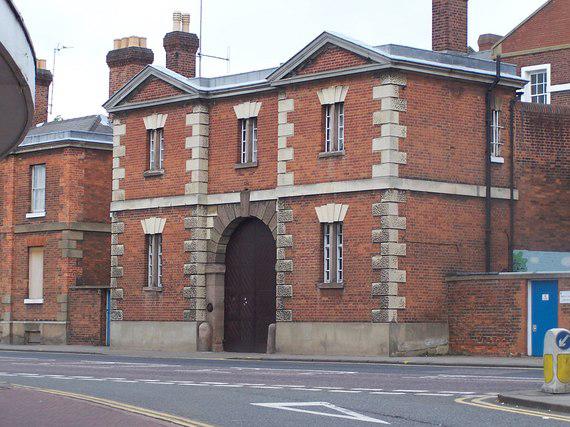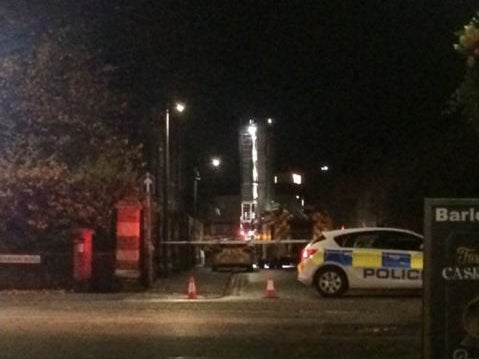Prisoners rioted 'after being locked up for 23 hours a day and denied toilet paper'
HMP Bedford turned into 'sad picture of devastation' after six-hour riot, damning report finds

Your support helps us to tell the story
From reproductive rights to climate change to Big Tech, The Independent is on the ground when the story is developing. Whether it's investigating the financials of Elon Musk's pro-Trump PAC or producing our latest documentary, 'The A Word', which shines a light on the American women fighting for reproductive rights, we know how important it is to parse out the facts from the messaging.
At such a critical moment in US history, we need reporters on the ground. Your donation allows us to keep sending journalists to speak to both sides of the story.
The Independent is trusted by Americans across the entire political spectrum. And unlike many other quality news outlets, we choose not to lock Americans out of our reporting and analysis with paywalls. We believe quality journalism should be available to everyone, paid for by those who can afford it.
Your support makes all the difference.A six-hour riot involving hundreds of prisoners started after they were locked in cells for 23 hours a day and denied basics including toilet paper, a damning report has found.
The Independent Monitoring Board (IMB) said HMP Bedford was turned into a “sad picture of devastation” by the disorder in November.
Amid the ruins of two “totally trashed” wings, broken furniture and doors, a ruined segregation unit and destroyed prisoner records, only the library was left intact.
Investigators said the valued facility “remained untouched whilst the area around it was pulled to bits”, with one man leaving neatly hand-written notes reading telling those picking up the pieces that “this was caused by 23 hour lock-up; peace” and “we need to be treated like human beings”.
The IMB, which reports to the Government on prison standards, identified a catalogue of failings leading up to the violence at HMP Bedford.
The category B prison had capacity of 508 inmates at the time but there were only half the number of officers needed were available to work.
With only 55 available in the weeks before the riot, a “limited regime” was imposed seeing most prisoners locked in their cells for up to 23 hours a day as tensions rose.

The IMB said education courses, medical appointments and drug treatment courses were missed, adding: “This was not treating prisoners fairly. It led to a riot. Are prisoners treated humanely? Prior to the riot of November 2016 the answer was no.
“The inability to provide basic items such as soap, cleaning materials and toilet paper was a disgrace. At one stage prisoners in A-wing had to wait four weeks for letters to be sent home because of a shortage of envelopes.
“New prisoners did not always have pillows. There can be no excuse for this.”
The IMB said that it had expressed concerns over resources in last year’s annual report and that complaints had spiked for months as prisoners became “increasingly angry and frustrated”.
Limited staff were overwhelmed as conditions worsened, amid chronic shortages of basic items and “unacceptably dirty” conditions, including cockroaches and waste from pigeons.
Violence broke out when prisoners were unlocked briefly on the afternoon of 6 November, taking up improvised weapons and knives and starting fires.

Prison officers were ordered to withdraw as inmates took control A and B wings, although those on C wing did not participate in the rioting and apparently barricaded the wing to prevent other prisoners from entering.
Gangs gained access to the segregation unit and intimidated vulnerable prisoners, the IMB’s report said, while a small number donned protective gear from lockers as officers were ransacked.
No prison staff were injured but one prisoner was attacked and another experienced breathing difficulties.
More than 120 officers from the National Tactical Response Group took six hours to restore order, moving 227 prisoners were decanted to other jails around the country “with respect and without the unreasonable use of force”.
The IMB said the capacity of the prison has now been reduced to 261 and that although clear improvements have been seen to the running of HMP Bedford, concerns about underlying conditions.
The report noted that four inmates died in custody in the past year – significantly above the national average – and mental health case and work to reduce self-harm and suicide must improve.
It came after warnings about the smuggling of the former “legal high” Spice into HMP Bedford, which has been linked to violence at other prisons including HMP Birmingham.
Rioting broke out in the G4S-run prison the month after the disorder in Bedford, with disorder breaking out after prisoners seized keys to free inmates and caused damage and losses running into millions of pounds.
The IMB called on the Government to ensure that all British prisons have “sufficient staff to run decent and humane regimes”.
A spokesperson for the Prison Service said HMP Bedford had begun work to improve access to education and tackle contraband including drugs.
“Transforming prisons into places of safety and reform is our top priority and we are tackling the challenges we face head-on,” a spokesperson added.
“Across the estate, we are investing £1.3bn to modernise the prisons, and £100m to significantly boost the front line by 2,500 additional prison officers.
“We are on track to meet our recruitment targets and recently saw a net increase of 868 prison officers since January this year.”
Join our commenting forum
Join thought-provoking conversations, follow other Independent readers and see their replies
Comments